This just in from the Oracle Data Mining product management team:
"
The new Oracle Data Mining 10gR2 Tutorial has is now posted to OTN.
Oracle Data Miner 10.2.0.1 Tutorial (7MB) Apr 2006 (link to download zip file).
The link downloads a Zip archive that contains the tutorial in PDF format, a dump file containing tables used in the tutorial, and demo_import_mag.txt, the file used to illustrate File Import.
This is a great document for users to get started using Oracle's Data Mining functionality.
"
Link to Oracle Data Mining page on OTN.
Monday, April 24, 2006
Monday, April 17, 2006
Another Oracle Blog - on Apps Technology
Steven Chan, Director, Applications Technology Integration, has recently started a blog (link to blog, link to RSS feed) called "Oracle E-Business Suite Technology". As Steven descibes it, the blog is an "insider's take on technology stack-related topics for the Oracle E-Business Suite, with the occasional product announcement, glimpses into the inner workings of Oracle Development, editorials on business philosophy, and musings on IT industry news."
Discoverer customers who use the product with the Oracle E-Business suite should find this interesting, as announcements related to Discoverer versions and their certification with the EBS (sorry, this is probably not an approved abbreviation that I should be using...) would be covered here from an expert insider's perspective.
Discoverer customers who use the product with the Oracle E-Business suite should find this interesting, as announcements related to Discoverer versions and their certification with the EBS (sorry, this is probably not an approved abbreviation that I should be using...) would be covered here from an expert insider's perspective.
Thursday, April 06, 2006
Download a sample chapter from the Discoverer 10g Handbook
OTN has published a sample chapter (Ch-1) from Michael Armstrong-Smith's latest book, "Oracle Discoverer 10g Handbook", an Oracle Press title, and published by McGraw-Hill Osborne Media (link to Michael's site and blog).
Here is the link to the sample chapter - it is a PDF file, 19 pages long, 285KB in size.
See screenshots below.
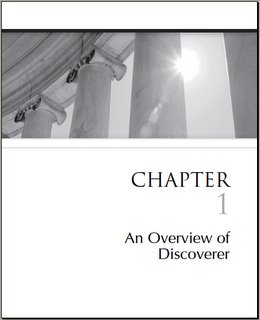
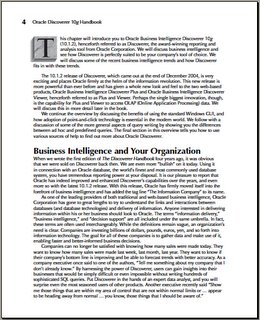
Here is the link to the sample chapter - it is a PDF file, 19 pages long, 285KB in size.
See screenshots below.


Wednesday, April 05, 2006
Poll results
Here are the results from the poll - close to 300 votes were received (less than I had expected), and thanks to everyone who voted.
The poll is now closed.

The poll is now closed.

Tuesday, April 04, 2006
Final call to vote for your must-have Discoverer features
I shall be closing the poll for the features you absolutely want to see in the next release of Discoverer tomorrow morning (link to poll). If you haven't already voted, do so - it takes only a minute.
ProClarity No More
This had to happen. And it did. Microsoft has announced that it is buying ProClarity (link to news article). This is supposed to fill a 'gaping hole' in Microsoft's BI tools story, viz. the absence of an adhoc query tool. There will be enough analysis and dissection of this event, so I shall limit my char paise (that would be the Indian equivalent of 2 cents) and make only a couple of points (strictly my personal opinion) :
- This confirms that there has been continuing confusion and indecision within Microsoft over the direction to take with respect to its BI Tools strategy. Does anyone remember Data Analyzer? This was something Microsoft used to pitch some 4-5 years back as a BI adhoc query tool. Then they stopped talking about it. Completely. Sometime in 2003 came the Reporting Services announcement. Microsoft realized they still did not have an adhoc tool. So they bought ActiveViews, and renamed it as "SQL Server 2005 Reporting Services Report Builder". Oh and yes, they also have something called 'Excel Add-In for SQL Server Analysis Services', that they no longer talk much about. Not to mention that Excel 2007 is supposed to have lots of BI capabilities built-in. And what about Excel services?
- Where does this leave the independent BI vendors? I had said this before that Microsoft had been deliberately not playing in the tools space as aggressively (that they had no clear positioning or articulation of strategy or half-decent product was another matter) and instead been focussing on building up its BI platform capabilities. It was content to have its partners build market and mindshare for its products and technologies like Analysis Services and XMLA. Now it is harvesting time. These BI vendors deserve a medal for having worked so hard and dilligently for Microsoft. As Murphy would say, "no good deed shall go unpunished" (link).
A poser to the BI vendors, "ab tera kya hoga kalia?" (link to Reference.com and Wikipedia for those not familiar with the Indian movie 'Sholay').
- This confirms that there has been continuing confusion and indecision within Microsoft over the direction to take with respect to its BI Tools strategy. Does anyone remember Data Analyzer? This was something Microsoft used to pitch some 4-5 years back as a BI adhoc query tool. Then they stopped talking about it. Completely. Sometime in 2003 came the Reporting Services announcement. Microsoft realized they still did not have an adhoc tool. So they bought ActiveViews, and renamed it as "SQL Server 2005 Reporting Services Report Builder". Oh and yes, they also have something called 'Excel Add-In for SQL Server Analysis Services', that they no longer talk much about. Not to mention that Excel 2007 is supposed to have lots of BI capabilities built-in. And what about Excel services?
- Where does this leave the independent BI vendors? I had said this before that Microsoft had been deliberately not playing in the tools space as aggressively (that they had no clear positioning or articulation of strategy or half-decent product was another matter) and instead been focussing on building up its BI platform capabilities. It was content to have its partners build market and mindshare for its products and technologies like Analysis Services and XMLA. Now it is harvesting time. These BI vendors deserve a medal for having worked so hard and dilligently for Microsoft. As Murphy would say, "no good deed shall go unpunished" (link).
A poser to the BI vendors, "ab tera kya hoga kalia?" (link to Reference.com and Wikipedia for those not familiar with the Indian movie 'Sholay').
Monday, April 03, 2006
Take the poll for must-have Discoverer features
I posted a poll on Friday (link), asking people to vote for their must-have features in Discoverer. I want to close this poll in a day or two, so this is a request for all people to take a minute and take the poll (click here to go to the post and vote) and also read some pertinent background information on the poll.
You can also drop me a line at abhinav.oracle at gmail dot com for more detailed feedback or anything you want treated in confidence.
Thanks!
You can also drop me a line at abhinav.oracle at gmail dot com for more detailed feedback or anything you want treated in confidence.
Thanks!
Congratulations to Michael for his ACE Nomination
I am absolutely delighted to post this: on Friday evening I received an email from Oracle's marketing team that Michael Armstrong-Smith (link to Michael's web site, link to Michael's blog) had been nominated to receive the Oracle ACE award for his substantial and excellent contributions to Discoverer in the Oracle technical community.
His profile should be added shortly to the Oracle ACE page (link).
Here's just a little bit about Michael's Discoverer contributions:
- In 2000 he wrote the original Discoverer Handbook, and in 2006 the updated Oracle Discoverer 10g Handbook was released by Oracle Press. The first book achieved a top 200 rank among all books on Amazon.com, while his second book has already reached the top 5000 in less than two weeks of its release.
- He is a member of different Oracle user groups like the IOUG, OAUG, ODTUG
- Between Metalink and OTN Forums he has answered over 600 posts and is one of the most prolific and knowledgable person out there.
- And he is a frequent presenter at different Oracle events and user group meets.
Once again, congratulations to Michael!
His profile should be added shortly to the Oracle ACE page (link).
Here's just a little bit about Michael's Discoverer contributions:
- In 2000 he wrote the original Discoverer Handbook, and in 2006 the updated Oracle Discoverer 10g Handbook was released by Oracle Press. The first book achieved a top 200 rank among all books on Amazon.com, while his second book has already reached the top 5000 in less than two weeks of its release.
- He is a member of different Oracle user groups like the IOUG, OAUG, ODTUG
- Between Metalink and OTN Forums he has answered over 600 posts and is one of the most prolific and knowledgable person out there.
- And he is a frequent presenter at different Oracle events and user group meets.
Once again, congratulations to Michael!
Saturday, April 01, 2006
Must Have In Discoverer
Thanks to everyone for taking the time to respond with comments and feedback (link) to my post on my request for features people would like to see in the next release of Discoverer (link to post). Some of the common requests were for automated scheduling & distribution, save-to-file, images in titles, more advanced conditional formatting, etc...
The good news is that the features people asked for are the ones that we have been hearing from customers, the sales force, and others - so the good thing is that there are no surprises there! The even better fact is that the new Oracle BI suite Enterprise Edition has all these features and a lot more. For example, you can do very nifty alerting and distribution using 'Delivers' in the Enterprise Edition, with the ability to send alerts to different devices.
There is a flip side to all this however - as you would have read in various web sites and through announcements (link to Google News) and on this blog itself (link to post, link to post on Oracle's BI briefing) that there are now three editions of Oracle Business Intelligence: Oracle BI Suite SE One, Oracle BI Suite SE, and Oracle BI Suite EE. While Oracle Business Intelligence Standard Edition (link to page on OTN) comprises Oracle Discoverer, BI Beans, Reports, and other products, the Standard Edition One and Enterprise Edition suites are built upon the analytics server that Oracle got from its Siebel acquisition. These two suites offer a lot of additional functionality, including many features that customers have been asking for in Discoverer.
Separately, Oracle has also committed to making Discoverer essentially a data source to the analytics server, which means that for those customers interested in adopting the Enterprise Edition, they would be able to leverage their existing investments in the current Oracle BI stack. Those customers that want to continue using Discoverer will be able to do that also, as we have committed to providing enhancements on top of Discoverer, in addition to Oracle's policy of providing lifetime support (link to the Discoverer statement of direction on OTN for more specific details). Also see Oracle's Lifetime Support Policy FAQ document (link to doc).
Therefore, a question that assumes more importance is that from among the basket of requirements that customers have, which are the ones that they would specifically want to see implemented in Discoverer.
I have created a small poll - please take a minute (will take even less than a minute actually) to fill out your responses...
If I have left out any choices that you think are important enough, do drop me a line at abhinav.oracle at gmail.com.
Disclaimer: while it should be obvious to most people, I still do want to state that this is not a commitment to deliver any functionality in any stated timeframes. Your responses shall help, certainly, and are an invaluable input into our planning. This blog, I hope, provides a quick way to elicit informed opinions from our customers, partners, and others interested in Oracle BI.
The good news is that the features people asked for are the ones that we have been hearing from customers, the sales force, and others - so the good thing is that there are no surprises there! The even better fact is that the new Oracle BI suite Enterprise Edition has all these features and a lot more. For example, you can do very nifty alerting and distribution using 'Delivers' in the Enterprise Edition, with the ability to send alerts to different devices.
There is a flip side to all this however - as you would have read in various web sites and through announcements (link to Google News) and on this blog itself (link to post, link to post on Oracle's BI briefing) that there are now three editions of Oracle Business Intelligence: Oracle BI Suite SE One, Oracle BI Suite SE, and Oracle BI Suite EE. While Oracle Business Intelligence Standard Edition (link to page on OTN) comprises Oracle Discoverer, BI Beans, Reports, and other products, the Standard Edition One and Enterprise Edition suites are built upon the analytics server that Oracle got from its Siebel acquisition. These two suites offer a lot of additional functionality, including many features that customers have been asking for in Discoverer.
Separately, Oracle has also committed to making Discoverer essentially a data source to the analytics server, which means that for those customers interested in adopting the Enterprise Edition, they would be able to leverage their existing investments in the current Oracle BI stack. Those customers that want to continue using Discoverer will be able to do that also, as we have committed to providing enhancements on top of Discoverer, in addition to Oracle's policy of providing lifetime support (link to the Discoverer statement of direction on OTN for more specific details). Also see Oracle's Lifetime Support Policy FAQ document (link to doc).
Therefore, a question that assumes more importance is that from among the basket of requirements that customers have, which are the ones that they would specifically want to see implemented in Discoverer.
I have created a small poll - please take a minute (will take even less than a minute actually) to fill out your responses...
If I have left out any choices that you think are important enough, do drop me a line at abhinav.oracle at gmail.com.
Disclaimer: while it should be obvious to most people, I still do want to state that this is not a commitment to deliver any functionality in any stated timeframes. Your responses shall help, certainly, and are an invaluable input into our planning. This blog, I hope, provides a quick way to elicit informed opinions from our customers, partners, and others interested in Oracle BI.
Friday, March 31, 2006
Michael's Discoverer Blog is up and running now
I had posted a couple of weeks back that Michael Armstrong-Smith had started a Discoverer blog (link to post, link to Michael's blog). The blog is now fully functional, and with a nice look and feel (LAF in Oracle-speak), Michael has been busy adding lots of very useful posts. Also included are posts related to his latest book, the Oracle Discoverer 10g Handbook, with clarifications (link) and errata (link).
I know I had said I would be posting excerpts from the book, but between a viral infection, a holiday, wife's trouble with a root canal infection and a wisdom tooth, daughter's indigestion, a convocation, and other stuff at work, I haven't had that much time. Hopefully things shall change for the better next month (which is tomorrow!!).
Did I say convocation? Yes!! I am now an MBA from the Indian Institute of Management, Bangalore (popularly abbreviated as IIMB) (see more on this blog). And a gold medallist at that (never hurts to do some self-publicity!).
I know I had said I would be posting excerpts from the book, but between a viral infection, a holiday, wife's trouble with a root canal infection and a wisdom tooth, daughter's indigestion, a convocation, and other stuff at work, I haven't had that much time. Hopefully things shall change for the better next month (which is tomorrow!!).
Did I say convocation? Yes!! I am now an MBA from the Indian Institute of Management, Bangalore (popularly abbreviated as IIMB) (see more on this blog). And a gold medallist at that (never hurts to do some self-publicity!).
Oracle and Office Interoperability Center on OTN
People may have missed this: there is a new sub-site on OTN for "ORACLE FUSION MIDDLEWARE and Microsoft Interoperability" (link to OTN page), which brings together under one sub-site all of Oracle's products and technologies as they relate to Microsoft Office.
There is also a new doc that has been released as part of the Oracle Application Server 10g (10.1.3) release (Part No B25781-01), titled "Oracle Application Server Developer's Guide for Microsoft Office Interoperability" (link to HTML doc, link to PDF doc).
To prepare this document a virtual team comprising of product managers and development contacts from different Oracle product groups was assembled and each product team then contributed their time and resources to bring to completion chapters for their specific product (or technology). One of the takeaways that people should get from reading this document is that even today there are a lot of areas where Oracle and Office integrate and there are lots of technologies that can be leveraged to bring more of Oracle's technologies and products closer to the end user using Office as an interface.
Here is a list of the chapters from the developer's guide:
There is also a new doc that has been released as part of the Oracle Application Server 10g (10.1.3) release (Part No B25781-01), titled "Oracle Application Server Developer's Guide for Microsoft Office Interoperability" (link to HTML doc, link to PDF doc).
To prepare this document a virtual team comprising of product managers and development contacts from different Oracle product groups was assembled and each product team then contributed their time and resources to bring to completion chapters for their specific product (or technology). One of the takeaways that people should get from reading this document is that even today there are a lot of areas where Oracle and Office integrate and there are lots of technologies that can be leveraged to bring more of Oracle's technologies and products closer to the end user using Office as an interface.
Here is a list of the chapters from the developer's guide:
- Understanding Microsoft Office 2003 Extensibility Technologies
Which covers such topics as XML Schemas, Smart Technologies (Smart Documents, Smart Tags, Smart Clients, Smart This and Smart That), Task Panes, Research & Reference Services, and more. - Understanding Oracle Application Server Interoperability with Microsoft Office
- Part II then gets into the specifics of building Microsoft Office Interoperability technologies using Oracle products and technologies.
- Creating Smart Documents That Interact with Self-Service Business Processes
- Completing Forms and Entering Data Using Microsoft Office
- Securing Smart Documents and Web Services
- Delivering Business Activity Monitoring Alerts and Reports to Microsoft Outlook
- Delivering Business Intelligence Information to Microsoft Excel
This is the chapter that covers Discoverer and all the rich and different ways you can get static as well as refreshable and live information into Excel - via plain CSV (Comma Separated Values), or Excel HTML, binary Excel with formatting preserved, or export Discoverer crosstabs to Excel as Pivot Tables, or the Web Query (iqy) format, or using the OracleBI Spreadsheet Add-In that lets you use the familiar BI Query Builder and Calculation Builder to build and edit queries inside Excel. - Managing Tasks and Collaborating in Microsoft Outlook
- Provisioning User Identity Information and Alerting Microsoft Outlook Contacts
- Accessing in-Context Web Information and Invoking an Enterprise Portal
- Saving Microsoft Office Documents to the OracleAS Portal Content Repository
- Delivering Enterprise Reports to Microsoft Office with Oracle Reports
Monday, March 27, 2006
Oracle BI Suite Standard Edition
A few days, or maybe a few weeks ago, some over-enthusiastic, mis-informed BI vendors (actually, just one) jumped on the FUD wagon and started spreading rumours that customers should think of switching from Oracle'e BI products and onto their under-featured suite (the thought of BI vendors being mis-informed is quite a dichotomy if you think about it...) because of perceived 'uncertainty' over Oracle's BI strategy and vision.
Oracle's Business Intelligence Strategy Briefing in New York city on March 22, 2006 certainly put an end to that poppycock (link to meaning: the word is American in origin, and not British!), where Oracle made known its commitment and vision and strategy for the business intelligence market, both in the tools space and in the applications space (also read Mark Rittman's excellent initial analysis of the event and announcements - link to Mark Rittman's post).
So what happened to Discoverer: it is well and alive (of course), and has a rich pipeline of planned functionality. We in the BI group are working on defining and closing down on the features we want to include in the next release of Discoverer: product managers, development, QA, everyone!
And it is available, today (link to product page).
And you can download it from the Oracle Technology Network, today (link to download page).
As you would know, Oracle announced three packages of its BI products (link to Oracle BI page on OTN), and Discoverer is part of the Oracle Business Intelligence Suite, Standard Edition. So, what forms part of this edition?
In my new-found spirit of trying to make this blog more interactive, and to solicit opinion from the substantial readership that this blog enjoys, I request people to spare a couple of minutes (or longer if they so choose) and drop in a line or two on what they would like to see in the next release of Discoverer, and why.
You can click the comments link at the bottom of this post and leave your comments there, or if you want you can email me at abhinav.agarwal at gmail dot com and send me your feedback in complete confidence.
Lastly, I think I may possibly have been just the tiniest bit harsh in characterising this BI vendor's product offerings as under-featured.
Additional Links:
Webcasts from Oracle Business Intelligence Strategy Briefing - New York City, March 22, 2006 (link to page)
Business Intelligence & Data Warehousing Technology Center (link)
Oracle's Business Intelligence Strategy Briefing in New York city on March 22, 2006 certainly put an end to that poppycock (link to meaning: the word is American in origin, and not British!), where Oracle made known its commitment and vision and strategy for the business intelligence market, both in the tools space and in the applications space (also read Mark Rittman's excellent initial analysis of the event and announcements - link to Mark Rittman's post).
So what happened to Discoverer: it is well and alive (of course), and has a rich pipeline of planned functionality. We in the BI group are working on defining and closing down on the features we want to include in the next release of Discoverer: product managers, development, QA, everyone!
And it is available, today (link to product page).
And you can download it from the Oracle Technology Network, today (link to download page).
As you would know, Oracle announced three packages of its BI products (link to Oracle BI page on OTN), and Discoverer is part of the Oracle Business Intelligence Suite, Standard Edition. So, what forms part of this edition?
- Oracle BI Discoverer: Relational and OLAP data access and user-driven customizable dashboards
- Oracle BI Warehouse Builder: Rapid design, deployment, and management of data and metadata
- Oracle BI Spreadsheet Add-in: OLAP data access from within Excel spreadsheets
- Oracle BI Beans: For building powerful custom business intelligence applications
- Oracle Reports Services: High-fidelity enterprise reporting
In my new-found spirit of trying to make this blog more interactive, and to solicit opinion from the substantial readership that this blog enjoys, I request people to spare a couple of minutes (or longer if they so choose) and drop in a line or two on what they would like to see in the next release of Discoverer, and why.
You can click the comments link at the bottom of this post and leave your comments there, or if you want you can email me at abhinav.agarwal at gmail dot com and send me your feedback in complete confidence.
Lastly, I think I may possibly have been just the tiniest bit harsh in characterising this BI vendor's product offerings as under-featured.
Additional Links:
Webcasts from Oracle Business Intelligence Strategy Briefing - New York City, March 22, 2006 (link to page)
Business Intelligence & Data Warehousing Technology Center (link)
Thursday, March 23, 2006
Oracle's BI Strategy Briefing
I am unable to post in detail right now (lots of other things at work that are nearing or past deadline!), but here is the news in brief:
You may have heard from different quarters that Oracle was going to announce its BI strategy to the public on March 22, 2006 in New York City. The event took place yesterday, and the recordings are available on Oracle.com at this page (link).
The main speakers were Charles Philips, President of Oracle, Henry Morris, Group Vice President and General Manager, Integration, Development and Application Strategies, IDC, Thomas Kurian, Senior Vice President, Oracle, and Steve Miranda, Senior Vice President, Oracle.
I hope to go into some detail on this in later posts, but the following three things should be clear now:
Oracle has made it a visible priority to become a leader in the BI market.
Oracle has a suite of products, integrated and best-of-breed, that are aimed at the SME as well as the enterprise markets, and are available today.
There is a rich pipeline of great functionality and enhancements that is on the way.
What do people think about these developments? I would love to hear what people think about the presentation as well as what would they like to see from Oracle in the coming months.
You can either post your feedback on this blog, or if you want, drop me an email at abhinav.oracle at gmail.com (I am quite hesitant to give out my work email on the web... Even though Oracle's spam filters are awesome and do a great job of filtering out spam, I think it is better to be careful than sorry. Unlike free email accounts, I really can't change my Oracle email id without changing companies!)
You may have heard from different quarters that Oracle was going to announce its BI strategy to the public on March 22, 2006 in New York City. The event took place yesterday, and the recordings are available on Oracle.com at this page (link).
The main speakers were Charles Philips, President of Oracle, Henry Morris, Group Vice President and General Manager, Integration, Development and Application Strategies, IDC, Thomas Kurian, Senior Vice President, Oracle, and Steve Miranda, Senior Vice President, Oracle.
I hope to go into some detail on this in later posts, but the following three things should be clear now:
Oracle has made it a visible priority to become a leader in the BI market.
Oracle has a suite of products, integrated and best-of-breed, that are aimed at the SME as well as the enterprise markets, and are available today.
There is a rich pipeline of great functionality and enhancements that is on the way.
What do people think about these developments? I would love to hear what people think about the presentation as well as what would they like to see from Oracle in the coming months.
You can either post your feedback on this blog, or if you want, drop me an email at abhinav.oracle at gmail.com (I am quite hesitant to give out my work email on the web... Even though Oracle's spam filters are awesome and do a great job of filtering out spam, I think it is better to be careful than sorry. Unlike free email accounts, I really can't change my Oracle email id without changing companies!)
Wednesday, March 15, 2006
The Discoverer 10g Handbook from Michael Armstrong-Smith
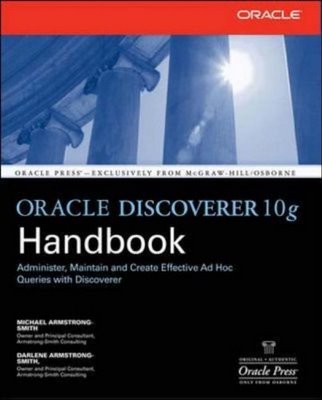 Michael Armstrong-Smith's latest book, Oracle Discoverer 10g Handbook, co-authored by his wife Darlene Armstrong-Smith, updated for Discoverer 10g, and based on the 10.1.2.45.46C release, is out due later this month. Michael tells me that the book is with the printers, and that McGraw Hill is expecting the book to come back shortly. Therefore it should start shipping by the end of the month, or sooner.
Michael Armstrong-Smith's latest book, Oracle Discoverer 10g Handbook, co-authored by his wife Darlene Armstrong-Smith, updated for Discoverer 10g, and based on the 10.1.2.45.46C release, is out due later this month. Michael tells me that the book is with the printers, and that McGraw Hill is expecting the book to come back shortly. Therefore it should start shipping by the end of the month, or sooner.You can view the book details on Michael's web site (link to site) or on Amazon.com (link to Amazon.com).
The book, apart from being extensively updated for the 10g release of Discoverer, has separate chapters for Discoverer Viewer, Discoverer OLAP, and Discoverer Portlets.
Mark Rittman (link to Mark's blog), Oracle BI & DW expert and Oracle ACE (link to Mark's ACE profile), has written the chapter on Discoverer OLAP.
Over the next few weeks I shall be posting more details about the book, including excerpts from different chapters (I acted as technical editor to the book, so I have some knowledge of the book and its contents :-). The biggest update to Discoverer in a long time now has the best and most comprehensive book to go with it.
How To Customize The Export Formats List in Viewer
In my previous post (link to post) I described how to add a quick export link to the main Viewer worksheet page that would let you export the currently opened Discoverer worksheet to a supported format.
This is kind of a followup post to the earlier one. Here I show how it is possible to construct a Viewer export page with only certain export formats available.
To begin with, it is important to know which export format corresponds to which 'resource key'. Not all formats are supported for both relational and OLAP worksheets, as you would have seen. Some, like the HTML, CSV, PDF, etc... are supported on both relational and OLAP connections, while some others like 'Excel as Pivot Table' are supported on only relational connections, while there are some export formats that work for both relational and OLAP worksheets.
This is the list of supported Export ids and resource Keys For Discoverer 10.1.2.45.46C (this also works for 10.1.2.48.18):
ID Resource Key Extension Supported Connection
0 export.type.csv (*.csv) Relational\OLAP
1 export.type.excel (*.xls) Relational
2 export.type.excel.pivot (*.xls) Relational
3 export.type.html (*.htm) Relational
5 export.type.reports (*.xml) Relational
6 export.type.text (*.txt) Relational\OLAP
7 export.type.pdf (*.pdf) Relational\OLAP
8 export.type.dif (*.dif) Relational
9 export.type.slk (*.slk) Relational
10 export.type.wks (*.wks) Relational
11 export.type.prn (*.prn) Relational
12 export.type.gif (*.gif) Relational\OLAP
13 export.type.png (*.png) Relational\OLAP
14 export.type.iqy (*.iqy) Relational Non SSO
16 export.type.html.excel (*.zip) Relational\OLAP
17 export.type.excel (*.zip) OLAP
Getting down to the nitty-grtty, this is how a regular Viewer worksheet export page looks like. I have expanded the dropdown so you can see the differences between relational and OLAP connections.
This is the list of export formats you get to see for relational worksheets:
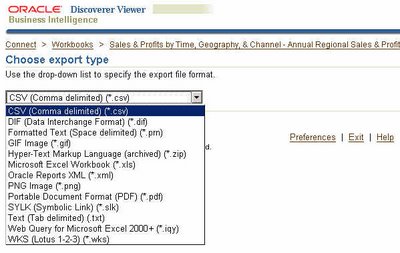 This list is missing the "Excel as Pivot Table" because the worksheet is a table and not a crosstab, in case you were wondering.
This list is missing the "Excel as Pivot Table" because the worksheet is a table and not a crosstab, in case you were wondering.
And this below is the export formats list you get to see for OLAP worksheets:
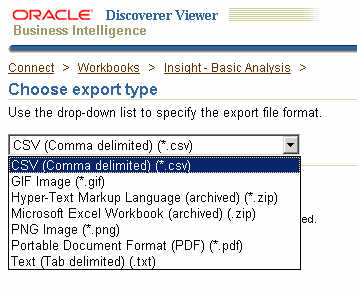 This then is the Viewre page that you want to modify. Actually, it is only the dropdown that you would be interested in modiying, removing certain export formats that may not be required andpresent a shorter, cleaner list to end users.
This then is the Viewre page that you want to modify. Actually, it is only the dropdown that you would be interested in modiying, removing certain export formats that may not be required andpresent a shorter, cleaner list to end users.
To do that (and you should be familiar with this by now), you have to locate where the UIX file for this export page resides. If you are unfamiliar with UIX then see some of my previous UIX Hack posts. Saves me time, saves you unwanted grief. After all, I am not a UIX expert by any stretch of the imagination, nor is it my intent to start a discourse on UIX here. Jonas Jacobi has a very good blog (link to blog) on UIX technologies, aptly called "Jonas Jacobi's JSF, ADF Faces and ADF UIX blog".
So, using Windows as my installation platform, I have Oracle Application Server 10g (10.1.2) installed on c:\ias, and that is where I go to.
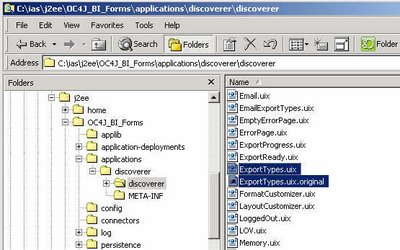
i.e. "c:\ias\j2ee\OC4J_BI_Forms\applications\discoverer\discoverer"
Here you shall find a lot of files that have the extension "UIX". Yippee... so far so good. Be careful now... the intent is not to muck around with every .uix file here; rather, it is only one file that we are interested in mucking up (I think I shall have to explain in some other post why I have this fascination for the word 'muck'). Therefore, as is suggested before people embark on mucking expeditions, make a backup of the "ExportTypes.uix" file first and foremost. Ah yes, also read the disclaimers at the end of this post.
Now, here is where the lobotomy starts. Open the "ExportTypes.uix" file using a text editor like Notepad, TextPad, JEdit, et.... and scroll down to the place where you find lines like these:
Find the contents inside the "contents" tag:
<contents childData="${uix.eventResult.exportTypeList}">
<option value="${uix.current.exportTypeValue}" text="${uix.data.nls[uix.current.resourceKey]}" />
</contents>
And replace them with the following lines:
<contents>
<option value="1" text="${uix.data.nls['export.type.excel']}" />
<option value="2" text="${uix.data.nls['export.type.excel.pivot']}" />
<option value="7" text="${uix.data.nls['export.type.pdf']}" />
</contents>
If the lines above do not display properly, you can also use these screenshots for reference.
The highlighted lines below are what you have to search for in the ExportTypes.uix file:
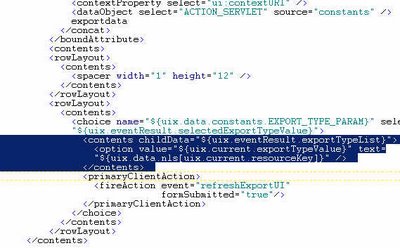
And replace them with the highlighted lines below:
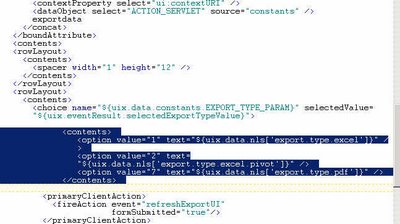
Having done these changes, you know what to do:
- Save and close this file.
- Restart your OC4J_BI_Forms instance. To do this you haveto login to your Oracle Application Server Control.
- Close and restart your browser.
- Connect to Discoverer Viewer, open up a worksheet, and navigate to the 'Export' page.
See the dropdown now. The dropdown now shows you only three export formats. You can now go back and edit the UIX file to add or remove as many export formats as you want. You have all the information you need available in this post now.
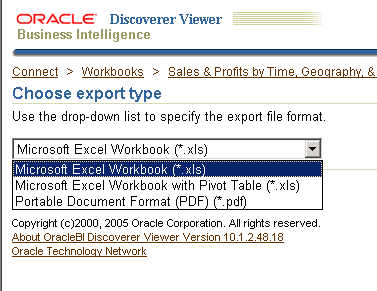 Ok... that's about all I have for this post. I do have a couple of things before I end this post.
Ok... that's about all I have for this post. I do have a couple of things before I end this post.
If you specify a relational only export format while trying to export an OLAP worksheet (and vice-versa) you will get an error. What error? An error like the one shown below:
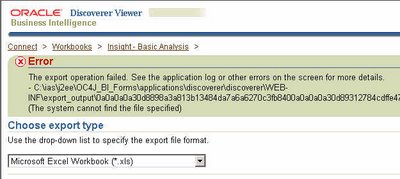 This is because when you let Discoverer construct the export formats dropdown list it know which formats to include for relational and which ones to include for OLAP. But here you have explicitly specified the export formats to show in the dropdown, and it is the same options that will be displayed, irrespective of the worksheet type, whether relational or OLAP. Therefore when you select a relational worksheet and specify that it be exported in an OLAP available format, then you are aksing for problems. Now, one could argue that the product should handle this instead of spitting out an error. But, firstly, it is handling matters by throwing out an error instead of doing something weird like not responding or churning out some garbage. Secondly, the whole notion of hacking UIX files is not encouraged or supported... you are basically hacking the product to do something that it was not built to do in the first place. That UIX technologies make so many things possible is an advantage, but needs to be used judiciously.
This is because when you let Discoverer construct the export formats dropdown list it know which formats to include for relational and which ones to include for OLAP. But here you have explicitly specified the export formats to show in the dropdown, and it is the same options that will be displayed, irrespective of the worksheet type, whether relational or OLAP. Therefore when you select a relational worksheet and specify that it be exported in an OLAP available format, then you are aksing for problems. Now, one could argue that the product should handle this instead of spitting out an error. But, firstly, it is handling matters by throwing out an error instead of doing something weird like not responding or churning out some garbage. Secondly, the whole notion of hacking UIX files is not encouraged or supported... you are basically hacking the product to do something that it was not built to do in the first place. That UIX technologies make so many things possible is an advantage, but needs to be used judiciously.
Oh, another thing... there is one more place in Discoverer Viewer where you can select the export type. Guess where? The email export type selection page! Remember? When you specify that a worksheet be emailed, you have to first select a format in which the worksheet should be emailed as. And here also you can customize the export formats dropdown to exclude certain export types. To do that you have to follow the same steps as above, but the UIX file that needs to be modified is "EmailExportTypes.uix": see the screenshot below. The file is in the same folder as where the "ExportTypes.uix" file is located. And the changes are the same, so I am not going to repeat them here.
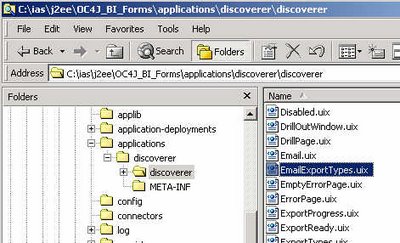
Related UIX Hacks posts:
UIX Hack 1 - Removing the 'Connect Directly' section
UIX Hack 2 – Remove the Last Refresh Date from Discoverer Portlets
UIX Hack 3 - Removing the 'type' column from a portlet
UIX Hack 4 - Removing the worksheet breadcrumb
UIX Hack 5 - Add A Quick Export Link to the Worksheet Page
The Disclaimer:
This is kind of a followup post to the earlier one. Here I show how it is possible to construct a Viewer export page with only certain export formats available.
To begin with, it is important to know which export format corresponds to which 'resource key'. Not all formats are supported for both relational and OLAP worksheets, as you would have seen. Some, like the HTML, CSV, PDF, etc... are supported on both relational and OLAP connections, while some others like 'Excel as Pivot Table' are supported on only relational connections, while there are some export formats that work for both relational and OLAP worksheets.
This is the list of supported Export ids and resource Keys For Discoverer 10.1.2.45.46C (this also works for 10.1.2.48.18):
ID Resource Key Extension Supported Connection
0 export.type.csv (*.csv) Relational\OLAP
1 export.type.excel (*.xls) Relational
2 export.type.excel.pivot (*.xls) Relational
3 export.type.html (*.htm) Relational
5 export.type.reports (*.xml) Relational
6 export.type.text (*.txt) Relational\OLAP
7 export.type.pdf (*.pdf) Relational\OLAP
8 export.type.dif (*.dif) Relational
9 export.type.slk (*.slk) Relational
10 export.type.wks (*.wks) Relational
11 export.type.prn (*.prn) Relational
12 export.type.gif (*.gif) Relational\OLAP
13 export.type.png (*.png) Relational\OLAP
14 export.type.iqy (*.iqy) Relational Non SSO
16 export.type.html.excel (*.zip) Relational\OLAP
17 export.type.excel (*.zip) OLAP
Getting down to the nitty-grtty, this is how a regular Viewer worksheet export page looks like. I have expanded the dropdown so you can see the differences between relational and OLAP connections.
This is the list of export formats you get to see for relational worksheets:
 This list is missing the "Excel as Pivot Table" because the worksheet is a table and not a crosstab, in case you were wondering.
This list is missing the "Excel as Pivot Table" because the worksheet is a table and not a crosstab, in case you were wondering.And this below is the export formats list you get to see for OLAP worksheets:
 This then is the Viewre page that you want to modify. Actually, it is only the dropdown that you would be interested in modiying, removing certain export formats that may not be required andpresent a shorter, cleaner list to end users.
This then is the Viewre page that you want to modify. Actually, it is only the dropdown that you would be interested in modiying, removing certain export formats that may not be required andpresent a shorter, cleaner list to end users.To do that (and you should be familiar with this by now), you have to locate where the UIX file for this export page resides. If you are unfamiliar with UIX then see some of my previous UIX Hack posts. Saves me time, saves you unwanted grief. After all, I am not a UIX expert by any stretch of the imagination, nor is it my intent to start a discourse on UIX here. Jonas Jacobi has a very good blog (link to blog) on UIX technologies, aptly called "Jonas Jacobi's JSF, ADF Faces and ADF UIX blog".
So, using Windows as my installation platform, I have Oracle Application Server 10g (10.1.2) installed on c:\ias, and that is where I go to.

i.e. "c:\ias\j2ee\OC4J_BI_Forms\applications\discoverer\discoverer"
Here you shall find a lot of files that have the extension "UIX". Yippee... so far so good. Be careful now... the intent is not to muck around with every .uix file here; rather, it is only one file that we are interested in mucking up (I think I shall have to explain in some other post why I have this fascination for the word 'muck'). Therefore, as is suggested before people embark on mucking expeditions, make a backup of the "ExportTypes.uix" file first and foremost. Ah yes, also read the disclaimers at the end of this post.
Now, here is where the lobotomy starts. Open the "ExportTypes.uix" file using a text editor like Notepad, TextPad, JEdit, et.... and scroll down to the place where you find lines like these:
Find the contents inside the "contents" tag:
<contents childData="${uix.eventResult.exportTypeList}">
<option value="${uix.current.exportTypeValue}" text="${uix.data.nls[uix.current.resourceKey]}" />
</contents>
And replace them with the following lines:
<contents>
<option value="1" text="${uix.data.nls['export.type.excel']}" />
<option value="2" text="${uix.data.nls['export.type.excel.pivot']}" />
<option value="7" text="${uix.data.nls['export.type.pdf']}" />
</contents>
If the lines above do not display properly, you can also use these screenshots for reference.
The highlighted lines below are what you have to search for in the ExportTypes.uix file:

And replace them with the highlighted lines below:

Having done these changes, you know what to do:
- Save and close this file.
- Restart your OC4J_BI_Forms instance. To do this you haveto login to your Oracle Application Server Control.
- Close and restart your browser.
- Connect to Discoverer Viewer, open up a worksheet, and navigate to the 'Export' page.
See the dropdown now. The dropdown now shows you only three export formats. You can now go back and edit the UIX file to add or remove as many export formats as you want. You have all the information you need available in this post now.
 Ok... that's about all I have for this post. I do have a couple of things before I end this post.
Ok... that's about all I have for this post. I do have a couple of things before I end this post.If you specify a relational only export format while trying to export an OLAP worksheet (and vice-versa) you will get an error. What error? An error like the one shown below:
 This is because when you let Discoverer construct the export formats dropdown list it know which formats to include for relational and which ones to include for OLAP. But here you have explicitly specified the export formats to show in the dropdown, and it is the same options that will be displayed, irrespective of the worksheet type, whether relational or OLAP. Therefore when you select a relational worksheet and specify that it be exported in an OLAP available format, then you are aksing for problems. Now, one could argue that the product should handle this instead of spitting out an error. But, firstly, it is handling matters by throwing out an error instead of doing something weird like not responding or churning out some garbage. Secondly, the whole notion of hacking UIX files is not encouraged or supported... you are basically hacking the product to do something that it was not built to do in the first place. That UIX technologies make so many things possible is an advantage, but needs to be used judiciously.
This is because when you let Discoverer construct the export formats dropdown list it know which formats to include for relational and which ones to include for OLAP. But here you have explicitly specified the export formats to show in the dropdown, and it is the same options that will be displayed, irrespective of the worksheet type, whether relational or OLAP. Therefore when you select a relational worksheet and specify that it be exported in an OLAP available format, then you are aksing for problems. Now, one could argue that the product should handle this instead of spitting out an error. But, firstly, it is handling matters by throwing out an error instead of doing something weird like not responding or churning out some garbage. Secondly, the whole notion of hacking UIX files is not encouraged or supported... you are basically hacking the product to do something that it was not built to do in the first place. That UIX technologies make so many things possible is an advantage, but needs to be used judiciously.Oh, another thing... there is one more place in Discoverer Viewer where you can select the export type. Guess where? The email export type selection page! Remember? When you specify that a worksheet be emailed, you have to first select a format in which the worksheet should be emailed as. And here also you can customize the export formats dropdown to exclude certain export types. To do that you have to follow the same steps as above, but the UIX file that needs to be modified is "EmailExportTypes.uix": see the screenshot below. The file is in the same folder as where the "ExportTypes.uix" file is located. And the changes are the same, so I am not going to repeat them here.

Related UIX Hacks posts:
UIX Hack 1 - Removing the 'Connect Directly' section
UIX Hack 2 – Remove the Last Refresh Date from Discoverer Portlets
UIX Hack 3 - Removing the 'type' column from a portlet
UIX Hack 4 - Removing the worksheet breadcrumb
UIX Hack 5 - Add A Quick Export Link to the Worksheet Page
The Disclaimer:
- I am NOT suggesting that you go around and muck around with these UIX files.
- Any changes you make to UIX files are unsupported.
- Oracle Support will not support your installation if you run into problems as a result of making changes to these UIX files.
- You will have to reproduce any errors on an instance without these UIX changes for Oracle Support to help you.
- Any upgrades or patches you apply may overwrite custom changes you make to your UIX files.
Subscribe to:
Posts (Atom)